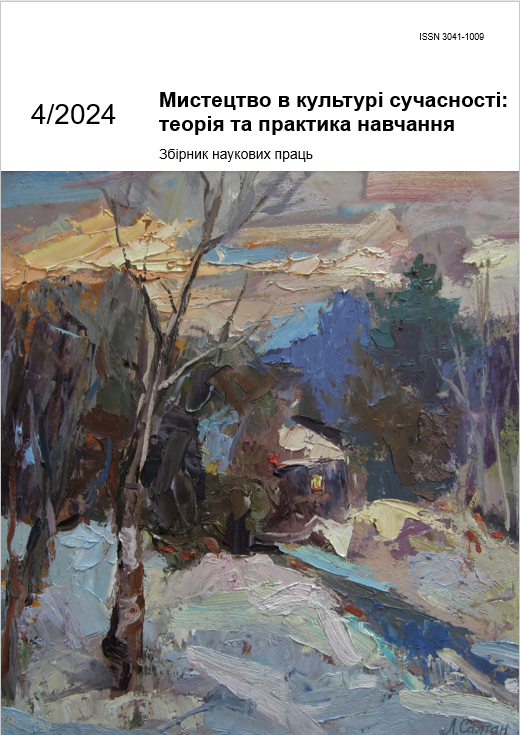CONTENT AND STRUCTURE OF TIMBRE-ORCHESTRAL INTONATION SKILLS FOR BACHELOR OF MUSICAL ARTS
Published 2025-01-02
Keywords
- skills; timbre; orchestra; intonation; pedagogy; bachelors of musical arts
Copyright (c) 2024 Ярослав Новосадов

This work is licensed under a Creative Commons Attribution 4.0 International License.
How to Cite
Abstract
The article is devoted to defining the content and structure of the skills of timbre-orchestral intonation of bachelors of musical art. In the context of modern requirements for music education, the key aspects of the development of education seekers related to the understanding and reproduction of musical material through its timbre-orchestral organization are highlighted. Special emphasis is placed on the importance of the formation of these skills as a basis for the interpretation of musical works in various performing and pedagogical contexts. It is indicated that these skills include the ability to analyze the timbre characteristics of instruments, an idea of their role in the general structure of the musical text, as well as practical use during performance or work with a musical work. Timbre-orchestral intonation skills are considered as the ability to perceive, analyze and reproduce a rich timbre palette, instrumental combinations, which is a key factor for further interpretation and a creative approach to the performance of a musical work. The structure of timbre-orchestral intonation skills is highlighted. It consists of three components – cognitive-motivational, reflective-sensory, cognitive-creative. We consider the cognitive-motivational component to be the core, since motivation crosses all the formations of a future teacher – needs, goals, ideals, will, beliefs. This component ensures the holistic nature of the performing and instrumental training of bachelors of musical art and reflects the level of motives for the activity of bachelors of musical art, the degree of formation of interest in pedagogical activity. The second component – reflective-sensory – combines the conscious perception of timbre features and emotional sensitivity in the process of interpreting a musical composition, the ability to realize one’s own performing process. The cognitive-creative component of timbre-orchestral intonation skills is based on the creative transformation of intonation ideas and their representation in practical activities, the features of sound production and is associated with the formation of the need for one’s own interpretative activity within the framework of performing and instrumental training.
Downloads
References
- Акімова О. Теоретико-методичні засади формування творчого мислення майбутнього вчителя в умовах університетської освіти: автореф. дис. … докт. пед. наук. Тернопіль, 2010. 44 с.
- Бех І. Рефлексія у духовному «Я» особистості. Рідна школа. 2011. № 8-9 (серпень-вересень). С. 9-14
- Маслоу А. Мотивація і особистість. Київ, 2004. 400 с.
- Москаленко В. Лекції з музичної інтерпретації. Київ: НМАУ ім. П. Чайковського, 2013. 134 с.
- Ростовська І. Формування мотивації учіння гри на фортепіано : навч.-метод. посібник. Ніжин : НДУ ім. М. Гоголя, 2015. 160 с.
- Савченко Г. Обґрунтування специфіки оркестрового мислення: теоретичний аспект. Музичне мистецтво і культура. 2022. № 2(34). С. 80- 92. https://doi.org/https://doi.org/10.31723/2524-0447-2022-34-2-7
- Селезньов С., Кшивак Ю., Новосадов Я. Виконавсько-інструментальна майстерність майбутніх учителів музичного мистецтва: теоретичний аспект. Науковий часопис УДУ імені Михайла Драгоманова. 2024. Серія 14. Теорія і методика мистецької освіти. Том. 31. С. 101-106
- Українська музична енциклопедія. Т. 2. Редкол. Г. Скрипник (голова) та ін.; НАНУ; Інститут мистецтвознавства, фольклористики та етнології ім. М.Т. Рильського. Київ: Вид-во Ін-ту мистецтвознавства, фольклористики та етнології НАН України, 2008. 664 c.
- Цеплітіс Л. Аналіз речової інтонації. АН Латвії. Ін-т мови і літератури ім. Андрія Уіта. Рига : Зінатне, 1974. 272 с.
- Шевченко Л., Хом'як І., Дем'янюк А. Новий словник іншомовних слів : близько 40 000 сл. і словосполучень. Київ, 2008. 472 с.
- Шип С.В. Музична форма від звуку до стилю: навч. посібник. Київ: Заповіт, 1998. 368 с.
- Щолокова О., Мозгальова Н., Барановська І. Інтерпретація музичних творів – методичний аспект. Науковий вісник Південноукраїнського національного педагогічного університету імені К. Д. Ушинського. Випуск 3 (128). Одеса. 2019. С. 151-158
- Descartes. Meditations on First Philosophy. URL: https://personal.lse.ac.uk/ROBERT49/teaching/ph103/pdf/Descartes_1641Meditations.pdf (дата звернення 25.11.2024)
- Hegel G. The Phenomenology of Spirit. URL: https://files.libcom.org/files/Georg%20Wilhelm%20Friedrich%20Hegel%20-%20The%20Phenomenology%20of%20Spirit%20(Terry%20Pinkard%20Translation).pdf (дата звернення 25.11.2024)
- Mozgalova, N., & Novosadova, A. GENRE-STYLE INNOVATIONS IN THE OEUVRE OF MODERN UKRAINIAN COMPOSERS. Baltic Journal of Legal and Social Sciences. 4. 2022. Р. 56-63. https://doi.org/10.30525/2592-8813-2022-4-7




